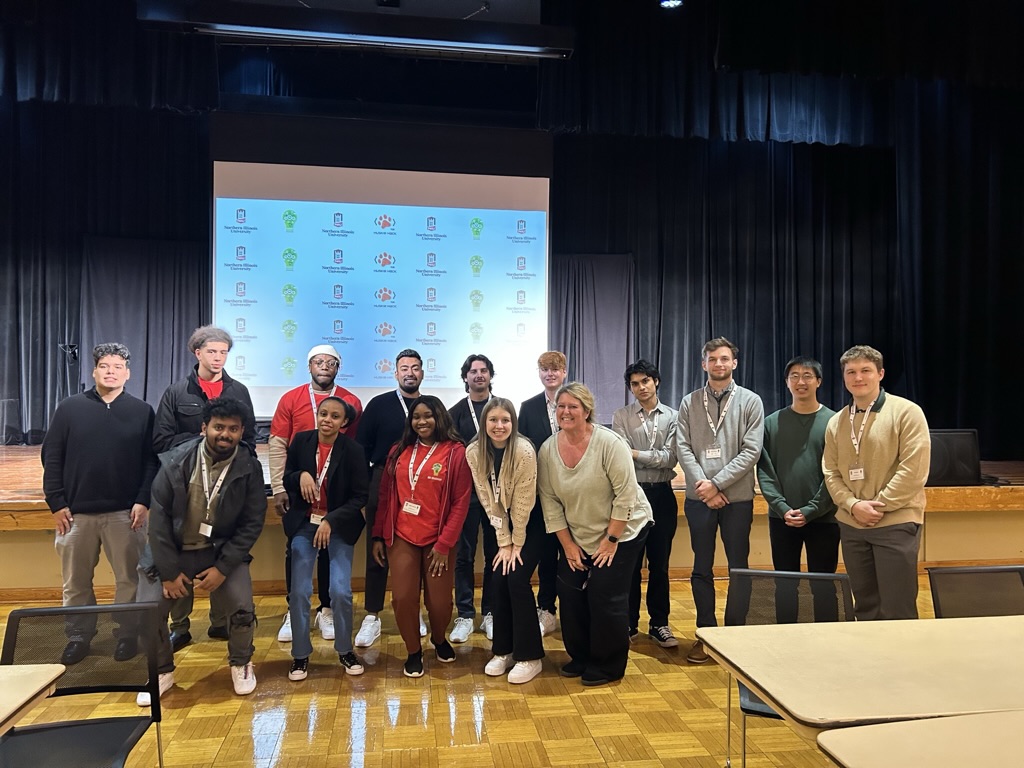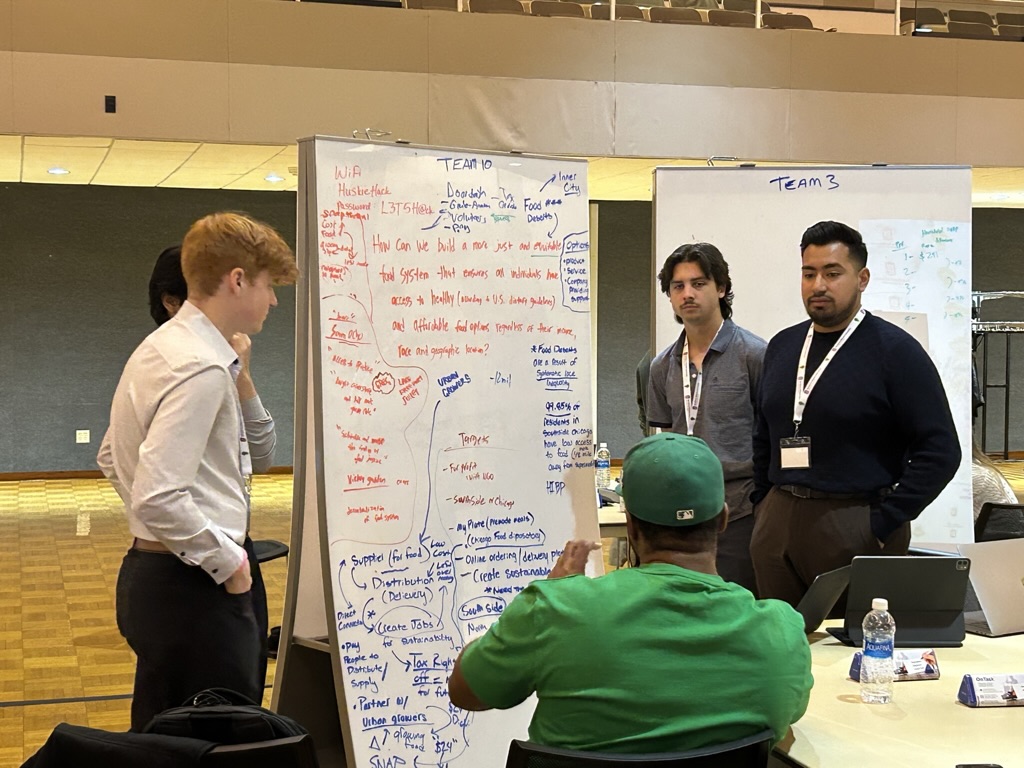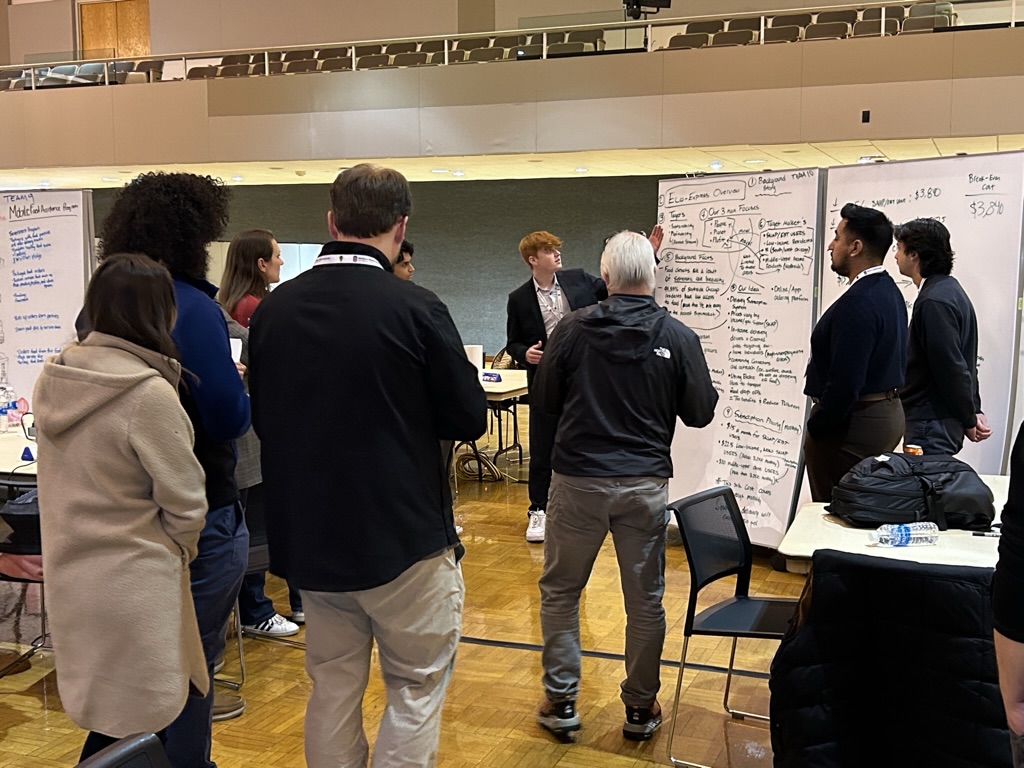
Teams of Driehaus students recently took away
first and third place at the Food Systems Innovation Challenge, a 24-hour hackathon focused on food justice and hosted by Northern Illinois University.
The experience was challenging and meaningful in equal measure. It gave students the opportunity to take insights from Business 103 — a core curriculum class focused on integrating social good into students’ careers — and apply them in a real-world setting.
Read on for reflections from three of the students who competed on the winning teams.
Ellie Miller, an accountancy student, was part of the first-place team. Her team won $3,000 for their concept of using vending machines to bring low- or no-cost fresh food to food deserts — a concept they would fund by installing vending machines at higher price points in locations such as high-end athletic clubs.
Human resource management major Daniel Salgado and finance major Lukas Taylor were part of the third-place team. Their team won $1,000 for a food delivery initiative that would partner with community grocers, farmers’ markets and other food programs to deliver fresh food to those enrolled in SNAP and EBT — and provide comprehensive support to delivery recipients in the process.
You’ll also hear from four members of the Business 103 teaching team — Juan Mendez, Melissa Markley, Summer Brown and Morgan Herron — about how opportunities like the hackathon can propel students into meaningful careers.
What drew you to participate in this hackathon?
Daniel Salgado: A big factor was it focusing on food justice. Personally, I see food justice every day with my grandma, and with all of my family that lives on the South Side. I can relate to this topic. And I think it was beneficial for me as a student just to put myself out there and participate in this competition.”
Lukas Taylor: My mom works in a nonprofit. My whole life has been about social good. The way Morgan [Herron] structured his class is around the idea that you’re making money, but you’re also doing good at the same time. That really interests me. You’re getting a livable wage, but you also have that connection to people. You’re making an actual impact.
Ellie Miller: I study accounting, and there are a lot of accounting case studies. But none of them really caught my eye until this one. It was an opportunity to apply knowledge to outside of class situations and to work with a team.
How did it feel to have just 24 hours to complete this challenge? What forms of support and advice did you receive?
Salgado: Having a 24-hour time period sounds like a long time, but it’s not. You have to think on the fly. You have to get your thoughts out relatively fast. That was the most challenging part. That, and the fact that you can’t be afraid to change your idea multiple times. I think we had three or four different iterations of our idea.

Taylor: Feedback from mentors was really helpful. Having insight from Dion [a mentor at the competition and founder of the food-access non-profit Dion’s Chicago Dream] really helped us. He showed us that we were too focused on the business aspect. We needed to focus more on the people and communication aspect.
Melissa Markley: Someone from the US government flew in to share what they’re doing. He spent probably two to three hours wandering around, talking to students, giving them really good insights. That’s a big deal.
And it was funny to see how students went from thinking they’d be done in five hours to using every minute they had. You could see that there was a big push for them. And in the end, they brought it all together.
How did this process push your thinking? How did your ideas evolve?
Our vending machine idea kind of started out as a joke. We were thinking, ‘how do you get food to people in the easiest way possible? Oh — a vending machine.’ Eventually, it got more developed. It was definitely a difficult challenge to come up with something innovative that also had minimal amounts of moving parts.
We all learned a lot going through that process of being mentally drained, of then having to completely 180 our plan. And I think we had a really great time doing it.
Salgado: I think one of the moments where a lightbulb went off was when Dion looked at our idea and he stressed that we need to focus on making jobs. As we figured out how we were going to integrate that, we decided to target two different demographics. Let’s target people on the South Side [where most residents have few to no accessible options for getting fresh food]. But let’s also make it accessible to everybody.
Taylor: Our big focus was also community. We didn’t want to be like Doordash, where we just drop it off at your door and take a picture. We wanted to be known in the community. We wanted [our delivery drivers] to show up and ask, ‘how are you doing? Is there anything else we can help you with?’
I think that’s really important because it would spread the word. It's free marketing, in a sense. And you’re marketing for a good reason.
What skills did this experience impart, and how did this connect with Business 103 at Driehaus?
Summer Brown: Projects like this give students the ability to see a career path for themselves in this space. There are lots of things you can do in this space with a business degree that are sustainable and livable for yourself — and where you can integrate your own sense of empathy and justice and care for the world. Making those connections for students through real-world projects is critical.
Juan Mendez: One thing we stress in 103 is: Ask the questions. Ask questions like, ‘what can I do? How do things connect? How can we come up with solutions [to social issues] that are feasible?’ Start thinking about how you look at things, about how we solve these problems. I was really proud to see the students asking those questions, thinking about them, pushing back. Having that skillset is really going to be important for the students as they move forward in their careers.
Morgan Herron: I want to say just how proud I am of the students who won from my classes. It was so great to see them going outside their comfort zone, showing up somewhere that they weren’t familiar with. I told them – it's just a win to be there. If you place, that’s fantastic: a great story for future employers. Without getting outside your comfort zone, it’s very hard to succeed in business. This first entrée [into that] will forever be a learning experience for them.
Markley: One of the things we talk a lot about in the class is how you identify the thing that you’re passionate about? How do you identify the thing that is going to drive you? What’s your motivation to make the world a better place?
These exercises really connect students with that. [Competitions like this help students] see that there are a bunch of different possible solutions.
The longer the competition went on, and the more tired they got, students actually engaged even more deeply with the topics. Their resilience and passion really shone through.
How did the competition influence where you see your career going?
Salgado: This experience was an eye-opener. It helped me understand what I’m passionate about. I want to work in human resource management. Social good aligns really well with that. So I’m trying to figure out how I can pursue both.
Taylor: I’m a finance major; I need to gain the [technical] knowledge. Going to this made me realize there are so many jobs in the financial industry where you’re not just crunching numbers for a big bank — you're finding solutions for people who are less fortunate.
This hackathon stressed creating solutions that are truly innovative. Now that you’ve gone through that process, what does innovation mean to you?
Taylor: What innovation means to me is diverging from the norm and creating something that no one would ever think of. And — especially in the social good environment — I think it really has to target people. Today’s age is so technology-focused that we’re almost losing that human touch.

Miller: Innovation doesn’t necessarily have to be complex! Our idea wasn’t super technical; it didn’t have a lot of moving parts. But it was a way to look at this problem in a different way, in a way that it hadn’t been looked at before.
Salgado: I think innovation is just making it your own. We had multiple iterations of our pitch. It all came down to the determination that we had. We came to the consensus that we wanted to own our project. In that process, innovation just fell into our lap.
Any final takeaways?
Miller: I think every student in the future should consider getting more involved with BUS 103. I really hope that participating in opportunities like this becomes a trend with future BUS 103 students. Knowing how everything went, I would have regretted not being involved.
Salgado: I’d also like to stress the importance of involvement in the college. I’m a transfer student; this is my second quarter at DePaul. This was the first experience I had getting involved outside the classroom. It’s definitely going to propel me to get more involved in other situations.
Morgan Herron: I want students to realize how important it was that you went to the hackathon. If you won — that’s a bonus! But you can see how excited everybody is. The groups know they’re going to keep working on these projects.
Mendez: We’re connecting with the mission of the university. We’re creating the business leaders of the future. This is what they’ll look like. And this is what they’ll stand for.